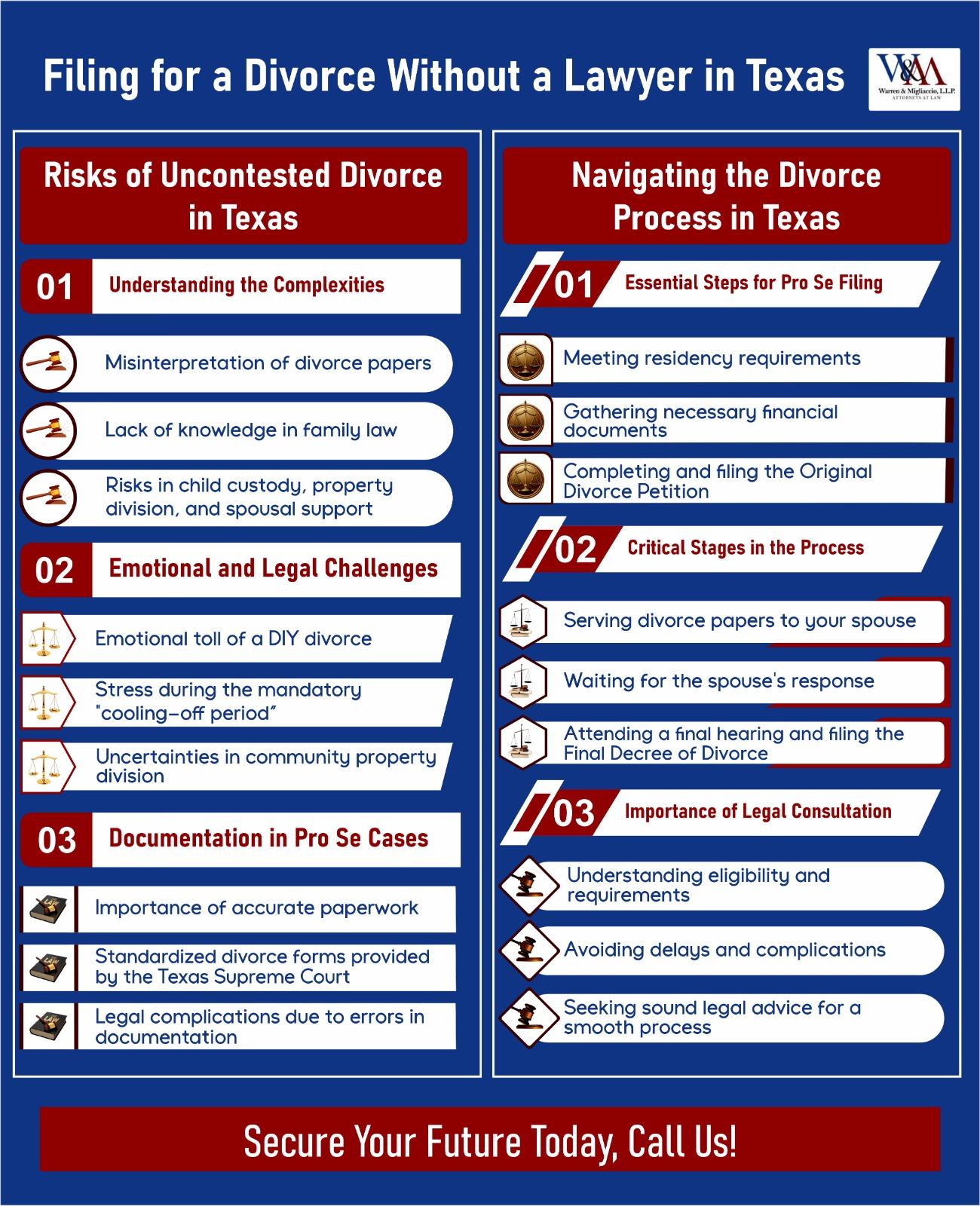Divorcing in Texas without a lawyer is sometimes a practical but not always suitable option for couples seeking to end their marriage simply and affordably. This process, known as a pro se or uncontested divorce, allows individuals to manage their legal proceedings. However, it’s crucial to balance the financial benefit against potential problems. In short, along with saving the cost of legal advice, couples must ensure that the entire process works effectively.
Risks Associated With a Uncontested Divorce
Ending a marriage can be complex and emotionally taxing. Opting for wedlock dissolution in a DIY divorce may seem financially advantageous since it can reduce the costs associated with legal fees.
However, one must weigh these potential savings against possible pitfalls. These include the challenges of understanding and executing divorce papers and understanding the intricacies of family law. Furthermore, should the process involve sensitive elements such as child custody, marital property division, or spousal support, tackling these issues without professional legal counsel can be risky.
General Complexities of a Texas Divorce
Challenges can accompany a Texas matrimonial breakup. Among them is the state’s requirement for a “cooling-off period” – a mandatory 60-day wait from filing the petition until the finalization.This intention aims to offer couples an opportunity for reconciliation but can also prolong the stress and uncertainty.

Additionally, Texas is a “community property” state, meaning any assets acquired during the marriage are considered jointly owned and must be divided equitably. Determining what constitutes an equitable division can become a highly contested and tricky matter, often requiring a divorce attorney and, sometimes, a trial to resolve disputes.
How to File for a Divorce in Texas Yourself
If you decide to file in Texas on your own, follow these essential steps to initiate the process:
- Determine your eligibility: Ensure that either you or your spouse has been a resident of Texas for at least six months and a resident of the county where you plan to file for at least 90 days.
- Gather necessary documents: Collect all relevant financial records, including tax returns, pay stubs, bank statements, and any documents related to marital assets and debts.
- Complete the Original Divorce Petition This divorce form starts the process. Be sure to include information about children, property, and the grounds for separation, whether no-fault or fault based.
- File the petition: Submit your completed petition to the district clerk’s office in the county where you or your spouse has met the residency requirements. You must pay a filing fee unless you qualify for a waiver due to financial hardship.
- Serve your spouse: Legally provide your spouse with the divorce papers using one of the acceptable service methods, such as by a sheriff or constable, a private process server, or, if the spouse agrees, through a Waiver of Service.
- Wait for your spouse’s response: Your spouse has a certain period, typically 20 days with a possible extension to the next Monday, to file an answer to your Petition for Divorce. This is true for uncontested and contested divorce.
- File a Financial Information Statement: This step may be required if your divorce involves child support or property division.
- Attend a parenting course (if applicable): In cases involving children, both parents may need to complete a parenting course approved by the state. File the certificate of completion with the court.
- Prepare a Final Decree of Divorce: This document outlines the divorce terms, including division of property, child custody, and support arrangements. Both spouses should agree on the terms before proceeding.
- Attend the final hearing: Once all paperwork is completed and the waiting period (a minimum of 60 days from filing the petition) is over, schedule and attend a final hearing where the judge can grant the divorce.
- File the Final Decree of Divorce: After the judge signs the decree, file it with the district clerk’s office to officially complete the divorce process.
Documentation in an Uncontested Divorce
To pursue a divorce in Texas without an attorney, it’s crucial that all required documentation is appropriately filled out and submitted. The Texas Supreme Court provides standardized divorce forms in uncontested cases where both parties agree on all issues.

Other forms may be necessary if children or shared property are involved, including the Child Support Worksheet and various financial disclosure statements. Correctly completing and filing these documents with the district court is a vital part of the divorce process. Errors can lead to delays or legal complications.
Texas Divorce Property Division
Under Texas law, all marital property is subject to a just and right division. However, this does not necessarily mean a 50/50 split. Instead, the court will consider factors such as each spouse’s earning potential, contributions to the marriage, fault in the relationship breakdown, and the needs of the children, if applicable. Separate property, including inheritances, gifts, and personal injury awards, remains in the original owner’s possession.

In dividing marital property, Texas courts often must untangle the finances and assets accrued over the course of the marriage. This process can be complicated when involving mixed community and separate property or when business ownership is a factor. Determining the valuation of assets, from real estate to retirement accounts, requires careful consideration and, in some cases, the help of a Texas divorce attorney.
Debt Is Also Divided
Debt acquired during the marriage can also be subject to division, which adds another layer to the mix. Spouses are encouraged to mediate and reach an agreement on their own to avoid an unpredictable division by the court. However, if the mediation fails, the court’s decision will hinge on what it deems ‘just and right,’ providing judges with broad discretion in rendering their decision case-by-case basis.

Couples are encouraged to reach an agreement outside of court, when possible, but if they cannot, a judge will make the final decision regarding the division of assets and liabilities. The implications of this process are far-reaching, affecting future financial stability and shaping the post-divorce economic reality of both parties. It is crucial for both parties to seek sound legal and financial advice to ensure a fair and equitable division of property.
Spousal Support in Texas Divorce Cases
Spousal support, often known as alimony, is another critical aspect of Texas divorce cases. Unlike child support, courts do not guarantee spousal support and instead award it on a discretionary basis. In Texas, alimony is typically considered only if the spouse seeking support lacks sufficient assets at the time of divorce to provide for their basic needs.

The determination of spousal support considers factors such as each spouse’s financial resources, education, employment skills, duration of the marriage, age, physical and emotional health, and the contribution of a spouse to the education or earning potential of the other.
Alimony is meant to be rehabilitative and is generally ordered for the shortest reasonable period that allows the spouse seeking support to earn sufficient income unless they cannot do so because of a physical or mental disability or responsibilities as custodian of a minor child. The complexities of spousal support highlight the importance of legal guidance to secure a fair outcome for both parties involved.
Child Custody and Support Without Legal Representation
Given the complexities of Texas family law, seeking child custody and support without legal representation can be an uphill battle. Self-representation in such cases requires a deep understanding of legal terms, child welfare standards, and procedural rules.

The court prioritizes the child’s best interests, which necessitates clear and convincing arguments from each parent regarding their capabilities to care for their child’s physical and emotional needs. Additionally, accurately calculating child support obligations is critical; a misstep or oversight could result in legal complications or unfair financial burdens down the line.
Parents considering self-representation should prepare themselves well, organize effectively, and educate themselves about their legal rights and responsibilities. However, we recommend that they seek counsel from a divorce attorney in Texas to ensure professional presentation of their case and full protection of their parental rights. The court must fashion child custody and support in the child’s best interests.
What Are the Legal Requirements for Divorce in Texas?
To file for a divorce in Texas, the state acknowledges both “no-fault” and “fault” grounds for dissolution of marriage. Under no-fault, parties may seek a divorce without blaming either spouse by saying the marriage has become unsupportable due to conflict, and there is no expectation of reconciliation. Fault grounds, however, require one spouse to prove the other’s misconduct. Recognized fault grounds in Texas include cruelty, adultery, the conviction of a felony with imprisonment or abandonment for at least one year, living apart without cohabitation for at least three years, or confinement in a mental hospital with little or no hope of recovery. Establishing fault can potentially influence the court’s decisions regarding property division, custody, and spousal support.
Benefits of Hiring a Texas Divorce Attorney
The decision to hire a Texas divorce attorney is crucial for several reasons:
- An experienced attorney can help a couple with the details of family law.
- A divorce attorney can help ensure all documents are filed correctly and deadlines are met.
- Your lawyer can represent a client during negotiations or in court. They can offer strategic advice on property division, child custody, and spousal support and help avoid common pitfalls that may negatively affect the outcome of a divorce proceeding.

- Moreover, attorneys are adept at handling the intricacies of high-conflict divorces, including those involving children or significant assets, ensuring that the process is handled with the necessary care and professionalism.
- In the emotionally charged atmosphere of a divorce, an attorney can also act as a level-headed advocate, helping clients to make rational decisions that are in their best long-term interests.
With so much at stake, the benefits of hiring a Texas divorce attorney are immeasurable. They offer peace of mind and a clear path forward during difficult times.
What About Do-It-Yourself Divorce Kits
Do-it-yourself divorce kits can be tempting for their cost-effectiveness, but trusting them entirely can be risky. These kits often lack the personalized guidance and expertise provided by a qualified attorney. When you’re going through a divorce, splitting up assets, figuring out child custody, and settling on support payments can really make your head spin. DIY kits may not adequately address these intricacies, potentially leading to costly mistakes or oversights in paperwork. Additionally, state laws vary, and generic kits might not be tailored to your jurisdiction’s specific requirements. Think twice before leaning on those basic templates for major life moments. Skipping out on expert legal guidance might leave you dealing with avoidable headaches later.
How Legal Representation Can Help
Filing for divorce on your own is a complex process, and it is essential to follow all legal requirements closely. Consider consulting with a legal professional to review your paperwork or provide guidance on the process. At the Warren & Migliaccio Law Firm, L.L.P., our experienced lawyers helped many clients contemplating or in the throes of divorce. We thoroughly investigate their situation and work out a marriage dissolution plan that will work for them.
Our divorce attorneys help our clients navigate the complex divorce process and provide them with compassionate support. We are committed to providing our clients with the best possible outcome. Contact us today at (888) 584-9614 to learn more about our services and schedule a free case review.
